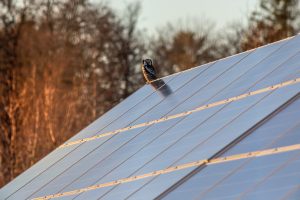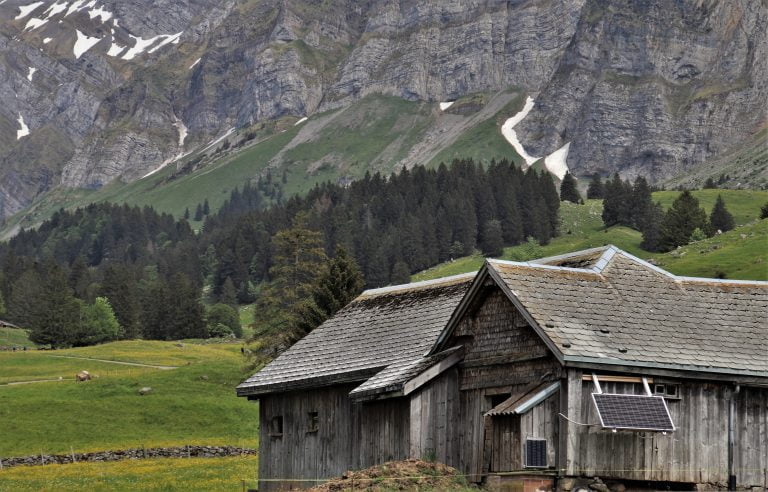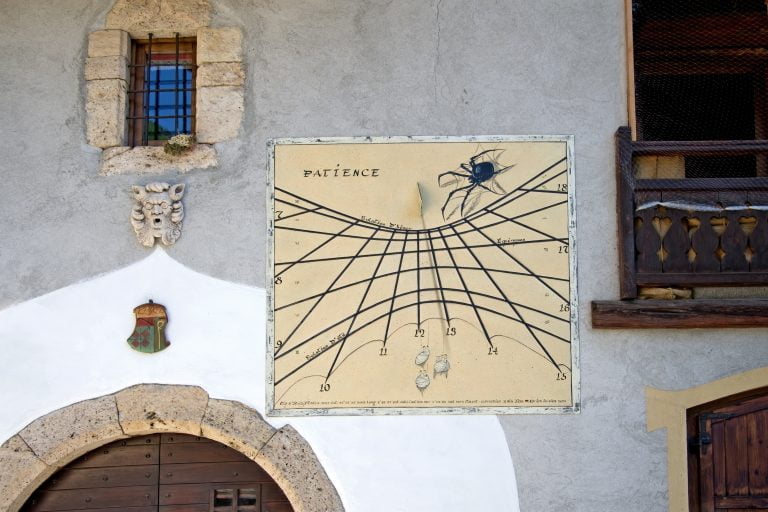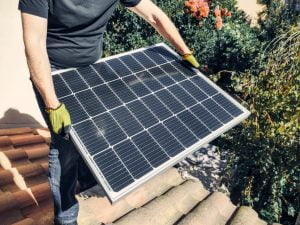Not only for campers, but also for mountain huts, alpine pastures, Maiensäss or campsites
Keywords such as energy self-sufficient, sustainable and renewable are on everyone's lips more than ever. The topic of energy supply is extremely topical these days. We are dependent on energyto cope with our everyday lives, be it for lighting, cooking, heating or operating technical devices - after all, the iPhone doesn't charge itself. In order to cover this energy requirement, we obtain Electricity from various sources. In the camper, it is the alternator that via the petrol or diesel engine is used in the household or at the campsite. This electricity does not grow on trees, but is generated from coal, gas or nuclear power plants and, in the "greener" case, from wind and hydropower. The disadvantage of this is that these energy sources are finite and not always sustainable on the one hand and not always and everywhere available to the necessary extent are. For this reason, the search for energy self-sufficiency is no longer just an issue for campers and caravanners, but also for mountain huts, garden sheds and even your own home.
content of this article
What is energy self-sufficiency?
Energy self-sufficiency means, for example, that you can use yourself, a mobile home or even a building provide yourself with sufficient energy can. This means that it does not need energy from outside to cover its own needs. There are various ways to achieve energy self-sufficiency. One of these is the use of renewable energies such as wind and solar energy. When hiking, you can have a mini solar panel with you, and when camping, the solar panel is most likely on the roof. But as a private individual, you can hardly put a wind turbine in your garden and the feed-in obligations for PV systems mean that any "self-sufficiency" can only be described in small words. However, all this sustainable energy supply stands facing a major challenge - it can only be utilised at the moment it is generated. But more on that later.

Advantages of energy self-sufficiency
Energy self-sufficiency has many advantages. On the one hand, it is environmentally friendlyas renewable energies are at least No local emissions cause. Where the wind turbine is being built and what the solar factory in the Middle East is doing is something we are used to closing our eyes to at the moment. On the other hand, there are No dependence on energy suppliers and therefore no rising energy prices - sun and wind are literally free. A self-sufficient energy supply can also minimise the risk of power outages and reduce the Security of supply increase.
Realising energy self-sufficiency is double-edged
Energy self-sufficiency can be achieved through various measures. The Use of photovoltaic systems on the roofs of buildings is probably one of the most popular methods of utilising solar energy, as the realisation of efficient wind power plants, geothermal energy or biogas plants on a small scale is still somewhat difficult or not feasible everywhere. But what happens when the sun isn't shining? This is often the case in the Uri Oberland, especially in winter. And what happens in the event of a power cut? Unfortunately, there is only bad news. Because most PV systems also no longer supply electricity in the event of a power failure. The inverter, which converts the direct current from the solar panels into usable 230 V alternating current at a frequency of 50 Hz for the socket, switches off as soon as it detects excessive fluctuations in the mains frequency or voltage. Therefore, it is not enough just to fit the entire roof with solar panels; the surplus energy generated must also be stored! It needs a supply of energy, that is truly self-sufficient from the grid and infrastructure.

Self-sufficient power supply without mains connection
On the one hand, it may be that the hut, mountain hut or permanent pitch of the camper is not connected to the public electricity grid at all, on the other hand, the Island system also for normal households be attractive. Stand-alone systems are now being used not only in places where a connection to electricity plants is not possible or too expensive, but also simply for the sake of self-sufficiency and energy efficiency. Independent with electricity at all times to be able to supply the system with electricity. To do this, the system needs all the necessary components for generating electricity from solar energy on the one hand and for Charging a battery storage unitto "store" the surplus solar power generated during the day and then be able to call it up at night or on rainy days. Operating your own electricity storage system does not necessarily rule out a connection to the public grid!
Self-sufficiency in winter
To work with the mix aus solar system and electricity storage To be completely self-sufficient, the entire system must be dimensioned in such a way that it can supply a building or camper with electricity without any gaps. While a camper in the snowy North Cape would probably struggle without a track drive and shore power socket, the island systems in the wintry Switzerland with rather rare hours of sunshine. The less sun, the more solar on the roof is the first idea. However, the area is usually quickly limited. More storage capacity is important as the next step, but here too, procurement costs are sooner or later a limiting factor. It is therefore inevitable that the demand for Self-sufficiency to adapt your consumption behaviour. If the sun doesn't shine for a few days, you have to do without the lasagne from the oven and the boiled laundry. This doesn't even include the hot shower!

Conclusion
Energy self-sufficiency can have great potential to reduce dependence on energy suppliers and promote the switch to renewable energies. The Realisation of energy self-sufficiency however, requires extensive planning and investment. However, the advantages of an autonomous energy supply can outweigh the costs and the justify the effort in the long term. The range of applications is more than diverse in the garden, on the mountain hut, alp or caravan, camper or boat. We not only realise projects in the camper and caravanning sector, but also ensure that off-grid properties are equipped with Autonomous solar systems with energy storage for an independent power supply.


